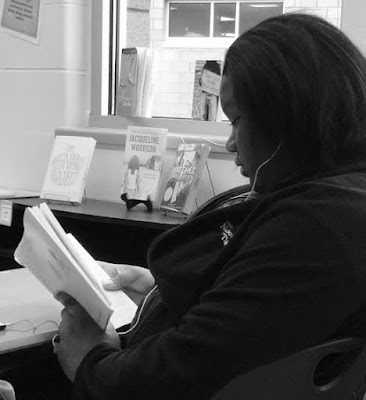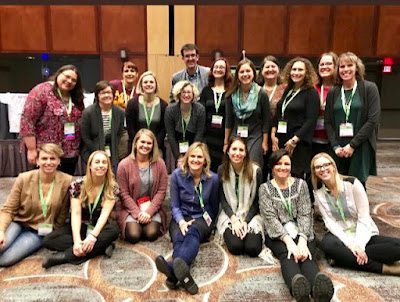YA Literature as Teacher PD
I remember the moment several years ago when I sat, book lying open in my lap, stunned as memories punched me in the face, hard. I had just read the part of Eleanor and Park where Eleanor successfully escapes her house before her stepfather smelled her little brother's urine. She had fallen asleep next to him as she tried to comfort him the night before. She's wearing the same clothes as the day before. She has no backpack. She also hasn't combed her hair or had breakfast. But she's on the bus, going to school.
How many times had I spoken to students who had shown up with nothing for school? How many times had I said, "You must bring your book to school. Your notebook. Your pen." or "When it becomes important to you, you'll remember to bring it"? I might have said it kindly, or I might have said it with exasperation because it happened a lot.
At this moment I realized that it didn't matter how I said it. What mattered was that I had said it, that I had implied that the kid was irresponsible, forgetful, wrong. What I hadn't considered were the other possibilities. What I hadn't done was just ask, "Everything OK?"
What if one of my students was in a situation like Eleanor's, and like Eleanor, didn't say anything to anyone? What if I was wrong about the kid not caring, not remembering? What if my words, regardless of the tone, just added to their feelings that adults didn't understand and could do nothing to help them?
I believe strongly in professional development for teachers. I have participated in book studies about topics such as differentiation, equity, reading instruction, writing instruction, standards-based grading. I do Twitter chats, attend conferences, follow my favorite teacher leaders on Facebook. But often the most powerful PD I do happens in the pages of a book. Eleanor and Park let me live in Eleanor's world, feel her intense pain and protectiveness of her young siblings, in a way nothing else had. Reading Angie Thomas' book The Hate U Give transported me into Starr's life. I got an inside look into her worlds - her white prep school, the neighborhood where she lived, and the internal world of her mind. None of my equity training had ever made those feel so alive, so real.
One of our school counselors always says that all behavior makes sense in context. But how often do we not know the context? Kids do not come to school ready to tell everything about their lives. They come with their life experiences, a set of assumptions about the way the world works, and about how people are. How teachers are. What school is. And often this means they do not open up about anything outside of school.
We teachers, the adults in the room, also come with our own experiences and assumptions. We don't realize that what we've accepted as the way things are, isn't the way things are for everyone. Normal looks different depending on what you've experienced, and kids are a complex mix. Their outsides don't always match their insides. Their backgrounds don't always match their behavior. And, just because they remind us of students we've taught before, that doesn't mean they're anything like the previous ones.
Reading young adult literature is a great way for teachers feel empathy, to live the feelings and the perceptions of our teens. It helps adults to step back into the uncertainty of adolescence, to remember navigating a world of friendships, first love, school pressures and family. It helps us be open to the possibility that our first reading of a situation might not be the truth. Reading young adult literature helps us be aware that what we see is often a mask.
When I read Jennifer Niven's powerful book All the Bright Places, the depth of depression hit home. I lived it with Violet and Finch in a way that no mental health presentation, guest speaker at our school or nonfiction book study had ever done. It made me see students who act out with eyes of curiosity. Was this the behavior of an an attention-seeking rebels or as there something else going on? Curiosity leads to questions, to openness, to learning and to connection.
I'm not suggesting that reading YA novels makes us qualified to diagnose illnesses or that all kids who forget their backpacks are experiencing abuse. Quite the contrary. I am suggesting that reading young adult novels teaches us that we must ask questions, consider alternatives, and wonder what might be happening in a student's life.
 Sometimes it's the world right under our own noses that is opened up through a book. Reading Lynda Mulally Hunt's Fish in a Tree and Pat Schmatz's Bluefish made me feel what kids who struggle to read face every day. How frustrating to have your motives completely misunderstood, like when Ally brought her teacher a sympathy card for her baby shower. She didn't know it was a sympathy card, but liked the flowers. How defeating to have your inability to read interpreted as laziness or lack of caring, like Travis in class after class.
Sometimes it's the world right under our own noses that is opened up through a book. Reading Lynda Mulally Hunt's Fish in a Tree and Pat Schmatz's Bluefish made me feel what kids who struggle to read face every day. How frustrating to have your motives completely misunderstood, like when Ally brought her teacher a sympathy card for her baby shower. She didn't know it was a sympathy card, but liked the flowers. How defeating to have your inability to read interpreted as laziness or lack of caring, like Travis in class after class.
We must start conversations with our students and be open to the fact that their motives and reasons might not be what we first think. When we live in the heads of characters, our own world expands. We now not only have our own experiences to rely on, we have those we have lived through books.
What books have opened your eyes and softened your heart? What favorites would you recommend to other teachers?
At this moment I realized that it didn't matter how I said it. What mattered was that I had said it, that I had implied that the kid was irresponsible, forgetful, wrong. What I hadn't considered were the other possibilities. What I hadn't done was just ask, "Everything OK?"
What if one of my students was in a situation like Eleanor's, and like Eleanor, didn't say anything to anyone? What if I was wrong about the kid not caring, not remembering? What if my words, regardless of the tone, just added to their feelings that adults didn't understand and could do nothing to help them?
I believe strongly in professional development for teachers. I have participated in book studies about topics such as differentiation, equity, reading instruction, writing instruction, standards-based grading. I do Twitter chats, attend conferences, follow my favorite teacher leaders on Facebook. But often the most powerful PD I do happens in the pages of a book. Eleanor and Park let me live in Eleanor's world, feel her intense pain and protectiveness of her young siblings, in a way nothing else had. Reading Angie Thomas' book The Hate U Give transported me into Starr's life. I got an inside look into her worlds - her white prep school, the neighborhood where she lived, and the internal world of her mind. None of my equity training had ever made those feel so alive, so real.
One of our school counselors always says that all behavior makes sense in context. But how often do we not know the context? Kids do not come to school ready to tell everything about their lives. They come with their life experiences, a set of assumptions about the way the world works, and about how people are. How teachers are. What school is. And often this means they do not open up about anything outside of school.
We teachers, the adults in the room, also come with our own experiences and assumptions. We don't realize that what we've accepted as the way things are, isn't the way things are for everyone. Normal looks different depending on what you've experienced, and kids are a complex mix. Their outsides don't always match their insides. Their backgrounds don't always match their behavior. And, just because they remind us of students we've taught before, that doesn't mean they're anything like the previous ones.
Reading young adult literature is a great way for teachers feel empathy, to live the feelings and the perceptions of our teens. It helps adults to step back into the uncertainty of adolescence, to remember navigating a world of friendships, first love, school pressures and family. It helps us be open to the possibility that our first reading of a situation might not be the truth. Reading young adult literature helps us be aware that what we see is often a mask.
When I read Jennifer Niven's powerful book All the Bright Places, the depth of depression hit home. I lived it with Violet and Finch in a way that no mental health presentation, guest speaker at our school or nonfiction book study had ever done. It made me see students who act out with eyes of curiosity. Was this the behavior of an an attention-seeking rebels or as there something else going on? Curiosity leads to questions, to openness, to learning and to connection.
I'm not suggesting that reading YA novels makes us qualified to diagnose illnesses or that all kids who forget their backpacks are experiencing abuse. Quite the contrary. I am suggesting that reading young adult novels teaches us that we must ask questions, consider alternatives, and wonder what might be happening in a student's life.
 Sometimes it's the world right under our own noses that is opened up through a book. Reading Lynda Mulally Hunt's Fish in a Tree and Pat Schmatz's Bluefish made me feel what kids who struggle to read face every day. How frustrating to have your motives completely misunderstood, like when Ally brought her teacher a sympathy card for her baby shower. She didn't know it was a sympathy card, but liked the flowers. How defeating to have your inability to read interpreted as laziness or lack of caring, like Travis in class after class.
Sometimes it's the world right under our own noses that is opened up through a book. Reading Lynda Mulally Hunt's Fish in a Tree and Pat Schmatz's Bluefish made me feel what kids who struggle to read face every day. How frustrating to have your motives completely misunderstood, like when Ally brought her teacher a sympathy card for her baby shower. She didn't know it was a sympathy card, but liked the flowers. How defeating to have your inability to read interpreted as laziness or lack of caring, like Travis in class after class. We must start conversations with our students and be open to the fact that their motives and reasons might not be what we first think. When we live in the heads of characters, our own world expands. We now not only have our own experiences to rely on, we have those we have lived through books.
What books have opened your eyes and softened your heart? What favorites would you recommend to other teachers?




Comments
Post a Comment